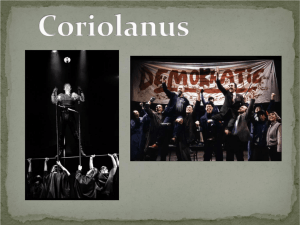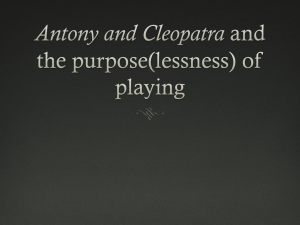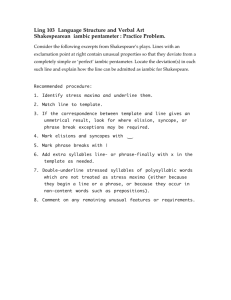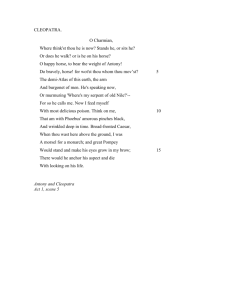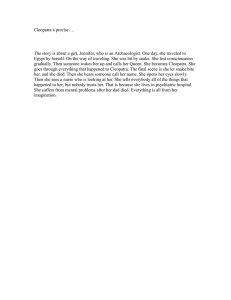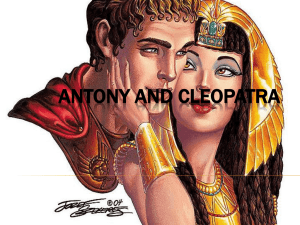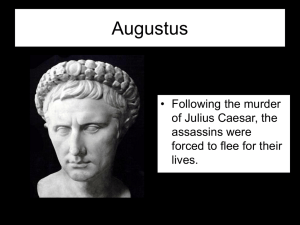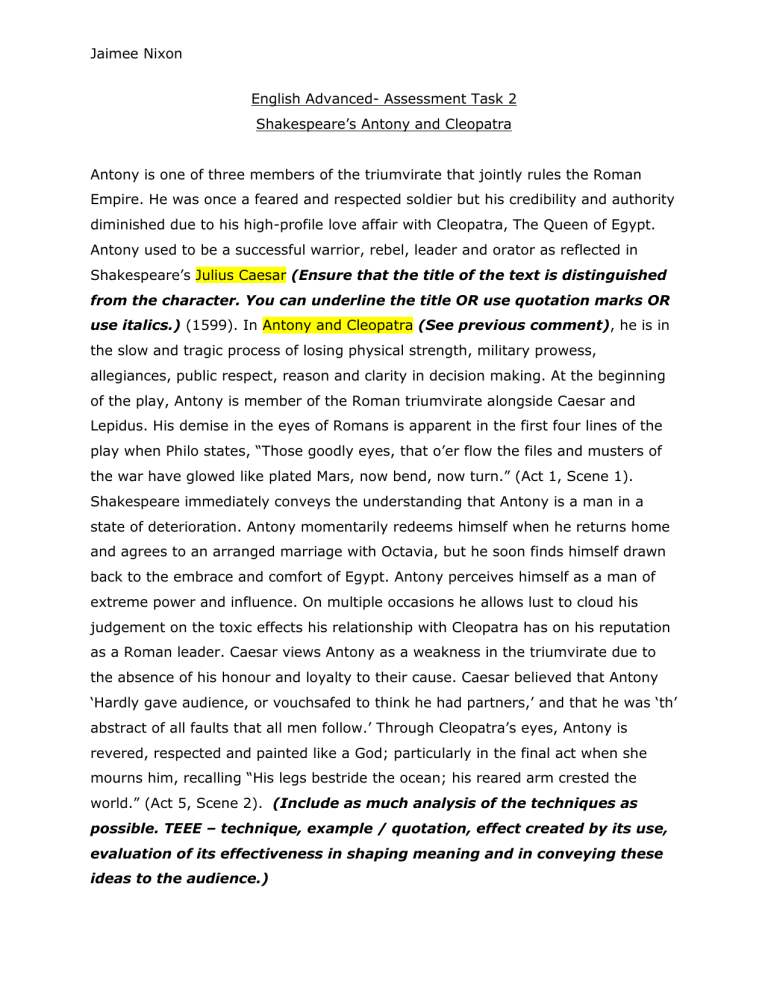
Jaimee Nixon English Advanced- Assessment Task 2 Shakespeare’s Antony and Cleopatra Antony is one of three members of the triumvirate that jointly rules the Roman Empire. He was once a feared and respected soldier but his credibility and authority diminished due to his high-profile love affair with Cleopatra, The Queen of Egypt. Antony used to be a successful warrior, rebel, leader and orator as reflected in Shakespeare’s Julius Caesar (Ensure that the title of the text is distinguished from the character. You can underline the title OR use quotation marks OR use italics.) (1599). In Antony and Cleopatra (See previous comment), he is in the slow and tragic process of losing physical strength, military prowess, allegiances, public respect, reason and clarity in decision making. At the beginning of the play, Antony is member of the Roman triumvirate alongside Caesar and Lepidus. His demise in the eyes of Romans is apparent in the first four lines of the play when Philo states, “Those goodly eyes, that o’er flow the files and musters of the war have glowed like plated Mars, now bend, now turn.” (Act 1, Scene 1). Shakespeare immediately conveys the understanding that Antony is a man in a state of deterioration. Antony momentarily redeems himself when he returns home and agrees to an arranged marriage with Octavia, but he soon finds himself drawn back to the embrace and comfort of Egypt. Antony perceives himself as a man of extreme power and influence. On multiple occasions he allows lust to cloud his judgement on the toxic effects his relationship with Cleopatra has on his reputation as a Roman leader. Caesar views Antony as a weakness in the triumvirate due to the absence of his honour and loyalty to their cause. Caesar believed that Antony ‘Hardly gave audience, or vouchsafed to think he had partners,’ and that he was ‘th’ abstract of all faults that all men follow.’ Through Cleopatra’s eyes, Antony is revered, respected and painted like a God; particularly in the final act when she mourns him, recalling “His legs bestride the ocean; his reared arm crested the world.” (Act 5, Scene 2). (Include as much analysis of the techniques as possible. TEEE – technique, example / quotation, effect created by its use, evaluation of its effectiveness in shaping meaning and in conveying these ideas to the audience.) Jaimee Nixon Relationships lovers Cleopatra co-rulers then enemies Aide-de-camp Caesar Enobarbus Antony Octavia spouses Pompey opponents Themes Shakespeare’s Antony and Cleopatra (See previous comment.) presents audiences with a number of significant themes including love vs duty and betrayal. The theme of love vs duty is central to Shakespeare’s Antony and Cleopatra. Antony’s major inner conflict is the way he’s torn between his duty as a Roman ruler and his wish to remain in Egypt with his lover Cleopatra. This inner conflict results in a war with his fellow triumvirs and both his and Cleopatra’s downfall and consequent death. ‘I must break Cleopatra’s powerful hold over me or else I’ll lose myself in foolish infatuation.’ It is through the use of metaphor in this soliloquy where Antony accepts his foolish nature and is determined to “from this enchanting queen break off.” the theme of betrayal is evident via Antony's shameful act of Jaimee Nixon neglecting his duties as a co-ruler of Rome to illicitly spend time with Egypt's beautiful Queen Cleopatra. It is notable that despite being among the three Triumvirs who rule over Rome, Antony controversially finds time to enjoy time with Cleopatra. Such an act amounts to Antony's disloyalty to Fulvia, one of his wives, as well as to his Roman government of which he is an integral part. In addition, Antony's act of marrying Octavia, who is Caesar's sister, constitutes disloyalty to Cleopatra to whom Antony is already intimate. To illustrate Antony's offense against Cleopatra, after she learns of Antony's marriage, Cleopatra becomes very furious. For example, she cries out 'Some monstrous malefactor. Prithee, friend, Pour out the pack of matter to mine ear, The good and bad together' Techniques A pivotal moment within Antony and Cleopatra is the climax of Antony’s downfall, an event foreshadowed from the very beginning of the play. Key themes reflected throughout this section of the play include betrayal and love versus duty. In Act III of the play, Antony and Cleopatra are fighting Caesar for control of the eastern Roman Empire. Antony hears a rumour that Cleopatra plans to betray him by turning her support to Caesar and he becomes consumed with rage. ‘And with those hands that grasped the heaviest club /Subdue my worthiest self. The witch shall die.’ In this soliloquy, Antony reveals to the audience that he believes Cleopatra’s actions are unforgiveable and that she deserves to die. The graphic and sensuous imagery utilised vividly conveys the deep hatred that has overtaken him and encourages the audience to sympathise with his predicament. Egypt poses a subversive threat to the seemingly uncomplicated world or Roman masculinity, challenging whether love potentiates or vitiates military bravery. This is a problem that Antony immerses himself in as he constantly journeys between the two countries, torn between his love for Cleopatra and his duty as a Roman Soldier. This internal war that plagued Antony everyday greatly contributed to his downfall due to the decisions that he made and the multiple issues he dismissed whilst in Cleopatra’s company. Due to his deep feeling for Cleopatra, all the reactions Antony had because of her actions were amplified. Once Antony had let the thought that Cleopatra was planning to betray him simmer in his mind, he confronted her in a Jaimee Nixon blind rage unaware that aware (What do you mean here?) that she had remained faithful to him the whole time. He lashed out ‘most monsterlike be shown For poor’st diminutives’. By using a combination of graphic imagery and a simile in his fury, Antony directly compares Cleopatra to a monster. After hearing this the audience begins to believe that this time there will be no going back for the two characters and understand that this is a pivotal moment in their relationship. As result, ‘As a result …’ this scene emotes a feeling of regret and sadness as the downfall of these characters and the disintegration of their relationship is now an unavoidable truth. Textual Integrity Shakespeare’s Antony and Cleopatra continues to engage modern audiences at an intimate level by exploring enduring ideas and values that are significant within society. The universal ideas of power, licentious sexuality, dominance and selfishness are reflected throughout the play via the characters (characters’ actions) actions, thoughts and the textual construction. Mankind’s ravenous need for power creates the basis of William Shakespeare’s historical tragedy Antony and Cleopatra, a cautionary tale exploring the battle between rational judgements and alluring passion. The polarity of the public world of Rome; (: colon rather than semi-colon)centred around responsibility and honour, and the private world of Egypt; (See previous comment) an exotic world of pure indulgence and hedonism, highlights the significant strength of licentious sexuality and the abuse political power (abuse of political power) associated with the human condition. Antony’s hamartia lies with his facilitation between both worlds, ultimately leading to his suicide, where the responders make a judgement to empathise with him or disapprove of his actions. (Perhaps ‘between empathy or disapproval’ could help with the word limit.) This tragedy transcends time and place, encouraging us to question our own mortality, and serves as a warning of the importance of equilibrium between logical thought. (Is this exactly what you wanted to say?) The complexity of the human experience is centred on mankind’s yearning for dominance, a power play between the public world of morality and the private world of self-indulgence. Antony’s hamartia lies with his inability to reconcile Jaimee Nixon between his toxic lover, the sexually powerful Cleopatra, and his hunger for political power, to which due to his hubris, is foolishly induced to challenge the calculated Caesar. (Can you rework this sentence to limit the words used and for improved clarity? Do not remove words like ‘hamartia’ and ‘hubris’.) Antony and Cleopatra’s universality allows responders to experience a sense of catharsis, purging them of their emotions through the fates of the characters, by gaining a sense of caution towards the power and status of a one’s reason, as well as a realisation for the significance of balance between both. (Can you refine this sentence for further clarity?) Throughout the play, Shakespeare focuses on the selfishness of human nature, particularly on the interactions between Antony and Cleopatra. Antony, infatuated by his romance with Cleopatra, disregards his duty in the Roman Empire as well as his loyal followers to chase after his flame. Cleopatra pursues Antony’s love even though he is married, ad (and) only cares about the state of their relationship. She even fakes her death so that Antony will declare his affections for her, a principal decision that contributed towards his impending death. Her enchantment never leaves Antony fully satisfied triggering a constant yearning, moulding him into a disposable object for her pleasure. The trickery and deception stemming from selfishness is the crux of their love affair and leads to the tragic downfall of both characters. Both Antony and Cleopatra as a pair are reflected as a godly and dynamic emblem of supreme selfish nature. (selfishness? – one word saved!) Jaimee, this is good so far. To reduce your word count, you need to refine your sentences further. Perhaps you could combine the ideas in some sentences or refine your sentences to ensure the fluency and clarity of your ideas. Whatever you do, however, keep the sophistication of your language choices. When you can, substitute an adjective and an abstract noun for wordiness. This will allow you to write more succinctly and with clarity and sophistication.
